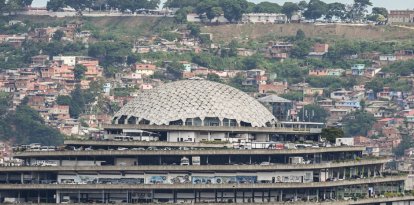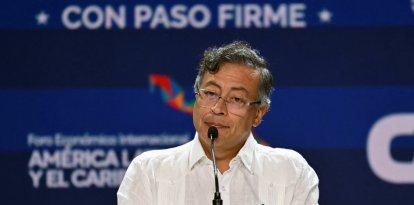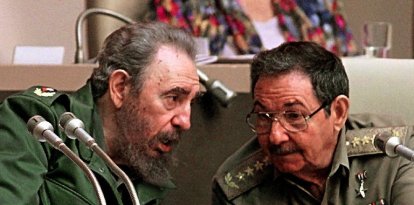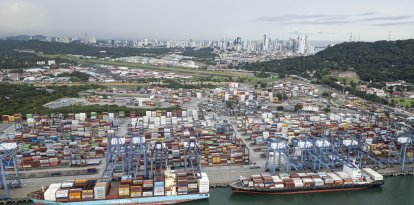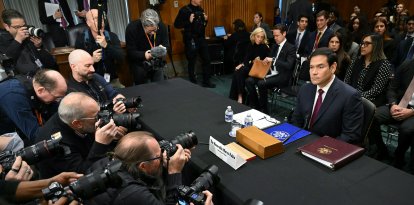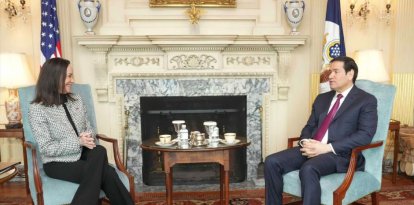"It's not as easy as it seems": The Bukele method in Ecuador
Daniel Noboa's administration is facing a terrible security crisis that has made the country one of the most violent in Latin America.

(Cordon Press)
"It's not as easy as it seems," declared the president and candidate for re-election in El Salvador, Nayib Bukele, when the situation in Ecuador erupted last Tuesday. From El Salvador, Bukele has been observing how the situation with criminal groups worsens in Ecuador which is taking its time to react to the problem. Many wonder if the Salvadoran anti-crime policy could emerge again: Can the Salvadoran model be exported to the rest of Latin America?
Daniel Noboa clenches his fist
Since the young, new Ecuadorian president came to power, the country seems to be addressing its public security problem with new energy. The decrees of previous President Lasso were not enough for Daniel Noboa, 36, to fight against narcoterrorists in his presidential campaign and in his speech as the country's current leader.
The new president assured after the coordinated attack by narcoterrorist groups on January 9 that his government will take the necessary measures to confront the problem of crime. "To get out of this problem you have to have ostrich eggs, not cardboard eggs," the president said on a national radio station.
Following the coordinated attacks on January 9, the Ecuadorian president declared a state of emergency and called the military out onto the streets. The armed forces, along with the police, are now working to hunt down criminal groups that were declared enemies of Ecuador. According to data provided to the press on Wednesday, law enforcement has since managed to arrest 329 terrorists and kill five, the majority belonging to criminal gangs such as the Tiguerones, Lobos and the Choneros.
However, they are not the first measures that Noboa has resorted to. A week earlier, Noboa announced that he would imitate Bukele's model in El Salvador and create a new series of large penitentiary centers dedicated to criminal groups. The plans include building two new prison complexes with capacity for 12,000 inmates.
While announcing his project, Noboa made a direct reference to Nayib Bukele's mega-prisons in El Salvador. "For all the Bukele lovers," the young president joked when he made his announcement, "It's the same, the same. If they want to go, take a walk, meet her, stay one night, they can go, commit a crime.”
Breeding ground for crime
The disastrous year for violence in Ecuador was 2020. After Correa's mandate ended and in the twilight of his successor, Lenin Moreno, the country experienced an exponential increase in murders. In 2020, Ecuador had a stable security climate, with around 6.5 murders per 100,000 people per year. In 2023, the same figure went up to close to 48 murders per 100,000 people.
The origin of the violence is located in the use of the port of the city of Guayaquil, which is a key piece in the illegal distribution scheme of the large South American drug trafficking groups. The Guayaquil cocaine route was under the control of the Colombian FARC militias, which little by little had to abandon the region as a result of the peace processes with the government. This opened a window of opportunity for the FARC's competitors to control the passage of Ecuadorian drugs.
The situation got worse after resources and infrastructure were dismantled in the drug war in Ecuador. Some of these reforms were carried out by Rafael Correa's socialist government to distance himself from the United States, follow an anti-imperialist agenda and please Chavista Venezuela or Lula's Brazil. Between 2012 and 2017, Correa's leftist administration locked up a U.S. military base on the Pacific coast, ended cooperation with the DEA, and disbanded an elite Ecuadorian police narcotics unit that American agents had trained.
Export Bukelism
With this scenario, the Ecuadorian political sector will likely look at what El Salvador has done. The country has managed to reduce its rates of criminal violence drastically through a tough-on-crime policy, along with a series of talks.
The state of exception established by Nayib Bukele almost two years ago was the culmination of that aggressive policy that put the Salvadoran gangs in check. The alleged members began to flood the penitentiary centers through rigorous judicial processes that were questioned by international organizations.
However, is it possible to bring the Salvadoran model to other countries like Ecuador? Measures like mega-prisons may be simple marketing. The reality is that the situation in each country is extremely different. Yes, El Salvador is dealing with Maras, which are small criminal groups that get their income from extortion and crime, instead of drug trafficking. The situation is not the same in Ecuador, which has become a hub for drug trafficking on the way to the United States and Europe.
Tiziano Breda, a researcher at the Institute of International Affairs in Rome, said that the numbers were also on Bukele's side and this allowed him to win. According to Breda, since 2014, the Salvadoran authorities created a database on the gangs, which are estimated to have 75,000 members in a country of 6.5 million inhabitants. El Salvador had more than 25,000 police officers and 20,000 military personnel deployed on public safety missions, even before President Bukele reformed state forces to strengthen them and provide them with more resources.













